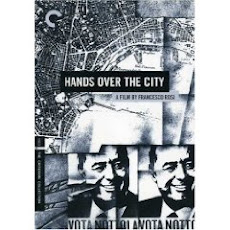"You know what the true sin is? Losing."
As Chris stated in his introduction, Rosi's "characters are important only to the extent they represent political positions and power", however each contains a professional/emotional duty complicating their role as a politician. Nottola and his scheming speculations show a self-righteous, arrogant businessman manipulating the political machine to make money. But his posturing about power and role as a councilman mask an infantile desire to build, to construct something large for the entire city to see and admire. De Vita is an engineer first and a leftist second, so his primary concerns are with the buildings themselves - the intricacies and fallacies of these structures and how they will affect they everyday working man. Finally, the Doctor, who not ironically is a centrist, gets torn, abused, and pushed from one side to the next, ultimately siding with his moral authority as a physician to fight Nottola. But each of these characters becomes defined not by their actions or reactions, but by the spaces Rosi creates for them.
Hands Over the City uses walls and textures unlike any film I've seen, paralleling character to mise-en-scene to provide a window into how and why the film is so political. Rosi begins this motif during the opening sequence as he tracks the morning transgressions of a local neighborhood, highlighting a construction site and the pummeling sound of a pile-driver. As two men attempt to get breakfast, a gigantic piece of concrete falls into frame, leading to a series of collapses bringing down an entire building. For the everyday person, identity and hope become crushed by the fabricated walls built by their politicians. Nottola's office on the other hand is crisply wallpapered with an intricate map of the city, covering his walls with a sense of detail and preciseness high atop the city. Later, we see his likeness plastered on the walls outside, like an infection spreading undeterred. Also, every politician's house contains wall to wall paintings, a suffocating indication of wealth, as if these are the only witnesses to the shady dealings occurring before them. In the city council chamber, the walls are cold stone, simple, undeterred. Rosi still sees temporary hope in this space, where Democracy can blossom into something more than a springboard for greed. Later, Rosi uses archival footage during the election rally to show walls of people, angry, passionate, motivated, but hood-winked, a documentary element ripe for consideration. Finally, the outside space of the development project provides a disturbing finale to the film, where so much possibility should grow strong, but in truth more of the same politicking will fester, turning the ground into swiss cheese.
Of course, there are countless more spots in the film where space defines the message and mood of the film, and I'm eager to see if anyone has any thoughts on this motif. Also, Rosi's use of pans, tilts, and zooms could inspire an entirely different thought-process on the film, but one still linked to the issue of space.







